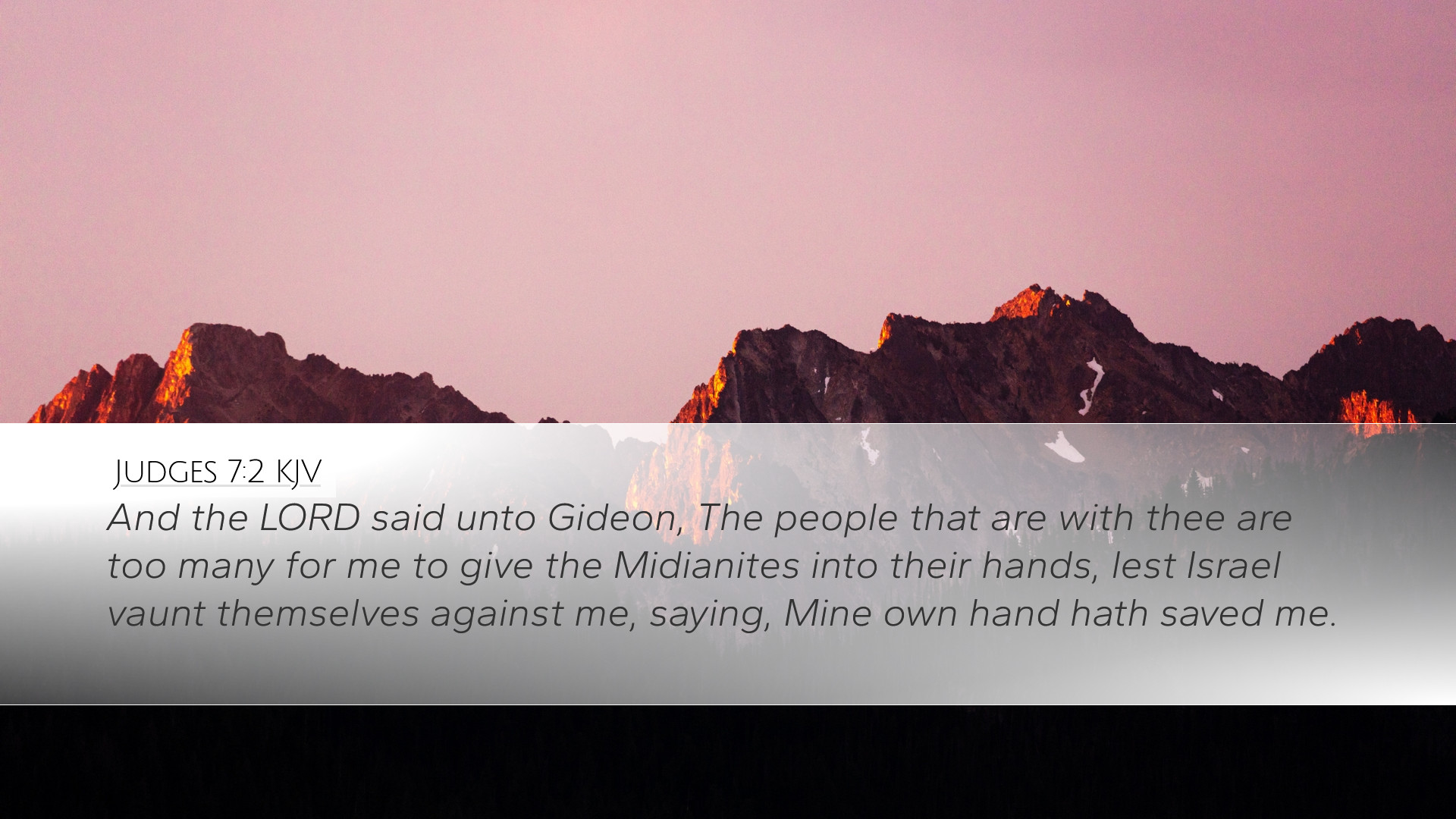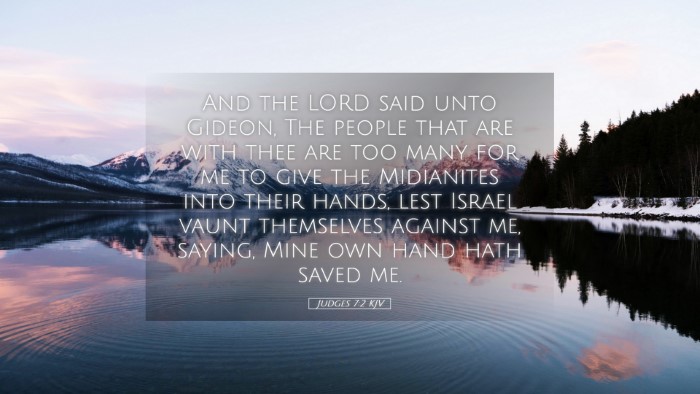Old Testament
Genesis Exodus Leviticus Numbers Deuteronomy Joshua Judges Ruth 1 Samuel 2 Samuel 1 Kings 2 Kings 1 Chronicles 2 Chronicles Ezra Nehemiah Esther Job Psalms Proverbs Ecclesiastes Song of Solomon Isaiah Jeremiah Lamentations Ezekiel Daniel Hosea Joel Amos Obadiah Jonah Micah Nahum Habakkuk Zephaniah Haggai Zechariah MalachiJudges 7:2
Judges 7:2 KJV
And the LORD said unto Gideon, The people that are with thee are too many for me to give the Midianites into their hands, lest Israel vaunt themselves against me, saying, Mine own hand hath saved me.
Judges 7:2 Bible Commentary
Bible Commentary on Judges 7:2
Verse Context: Judges 7:2 (KJV) states, "And the LORD said unto Gideon, The people that are with thee are too many for me to give the Midianites into their hands, lest Israel vaunt themselves against me, saying, Mine own hand hath saved me." This passage explores the divine strategy employed by God in the context of Gideon’s battle against the Midianites.
Introduction
This commentary draws insights from prominent public domain sources, including Matthew Henry, Albert Barnes, and Adam Clarke, to unravel the layers of meaning in this profound statement from God to Gideon. It serves as an essential resource for pastors, students, theologians, and scholars who seek to deepen their understanding of divine providence and human vulnerability.
Analysis of the Divine Strategy
1. Divine Perspective on Numbers
Matthew Henry notes that God's command to reduce Gideon's army highlights His tendency to use weakness for His glory. God states that Gideon has too many soldiers, indicating that human strength can often impede divine intervention. The richness of God’s intervention is seen not in abundance but in dependence.
2. The Danger of Pride
Albert Barnes underscores the importance of humility in this verse. God was concerned that if Israel were to win a victory with a large army, they might boast of their strength rather than recognizing God’s providence. This reflects the biblical principle that human pride can lead to spiritual downfall, as seen in 1 Corinthians 10:12, which warns, "Let him that thinketh he standeth take heed lest he fall."
3. The Nature of Faith
Adam Clarke elaborates on the theme of faith in this context. The reduction of forces to a mere handful signifies the necessity of trusting God over human capability. Faith does not rest in numbers, resources, or circumstances but looks to the omnipotence of God. This scenario teaches about the trials of faith—believers are called to trust God even when circumstances appear insurmountable.
Theological Implications
1. God’s Sovereignty
- God's directive to reduce Gideon's forces serves as a compelling reminder of His sovereignty. The concept that God intentionally thins the ranks contradicts human logic but affirms that victory comes not through numerical strength but through divine intervention.
- This serves a dual purpose: it asserts God's authority over Israel and portrays the ongoing call for Israel to lean upon Him. The verse points to the critical understanding that the complexity of God's plans may often appear contrary to human reasoning.
2. Faith and Obedience
The call to reduce Gideon's army is also an invitation to deeper faith and obedience. It encapsulates a prophetic lesson for believers today. Those called to serve God are often tested on the basis of their faithfulness in seemingly illogical circumstances. As Gideon obeys, it sets an example for those who will face their own trials.
Practical Applications for Believers
1. Recognizing the Weakness of Human Effort
- Believers are encouraged to acknowledge the limitations of their efforts in spiritual battles. Just as Gideon faced a seemingly impossible task, we too confront struggles that appear beyond our capacity to overcome.
- The assurance that God can accomplish much with little prepares the believer for facing challenges with confidence in divine assistance.
2. Cultivating Humility
The tendency to boast about victories should be checked by a sincere heart before God. Learning to give credit to God for His works cultivates a spirit of humility and reliance on His grace. This approach fosters community among believers as they reflect on God's deeds rather than personal accolades.
3. Strengthening Faith Through Trials
As challenges arise, faith must be fortified through prayer and the study of scripture. Gideon’s story encourages believers that every challenge brings an opportunity for divine encounter, and through obedience, one can witness the faithfulness of God manifested in their lives.
Conclusion
Judges 7:2 offers a profound reflection on the nature of God's engagement with humanity in the context of warfare and divine provision. The insights garnered from public domain commentaries remind believers of the importance of humility, faith, and dependence upon God's sovereign will. The narrative continues to inspire generations to trust in God, who uses the unlikeliest of circumstances to demonstrate His unmatched power and glory.


